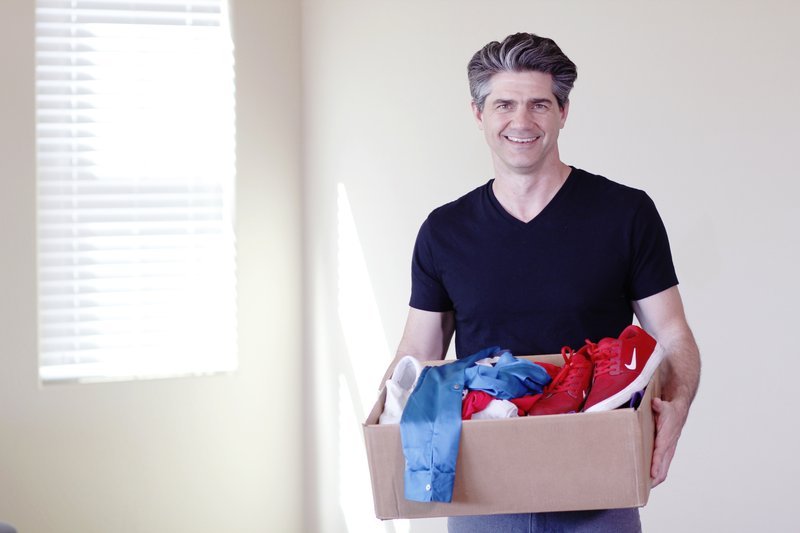I don't know about you, but I've had enough. Enough buying and spending, getting and giving, eating and, well, consuming in general. I am at a tipping point, and I am not talking about my scale, which is another problem altogether.
As I work my way through the annual holiday hangover, the words of born-again minimalist Joshua Becker call to me.
"Own less, live more" is his motto, and, dare I say, should be ours, too. The author of several books and a popular blog on minimalism, and host of an online decluttering course, Becker's advice feels like a juice cleanse right about now.
I called him for some ways to minimize and maximize my life.
Becker, 45, started by telling me about his tipping point 11 years ago. He was living in Vermont, working as a youth pastor, married with two young children. Over Memorial Day weekend, he and his wife decided to spring clean. He took on the garage.
The project — moving everything out, sorting, tossing, reorganizing, cleaning and moving much back in — took the whole day. During that time, he struck up a conversation with his neighbor.
"I was complaining to her about how much time this was taking, and she said, 'That's why my daughter is a minimalist. She keeps telling me I don't need to own all this stuff,'" he said. "I had never heard the term 'minimalist' before."
In that instant, he looked back toward his house. On one side he saw his 5-year-old son joyfully swinging on the swing set, and on the other he saw all his stuff waiting to go back in the garage. The disconnection was glaring.
"I realized that not only were my things not making me happy, but also that they were taking me away from what did," he said.
He went inside and said to his wife, "How about if we purposefully own less?" Having just spent her entire holiday cleaning out the kitchen, she hopped on board.
Over the next three years, they purged about half their belongings, and moved from Vermont to Arizona. Their downsizing allowed them to buy a smaller house (from 2200 square feet to 1700) in a nicer neighborhood. As they transitioned toward leaner, cleaner living, he wrote all about it.
"Our culture is good at stirring up discontent in our lives," he tells me. "We see advertisements all day long that tell us our life isn't as good as it could be if we bought or ate whatever companies are selling. We are constantly told we need to be consuming more in order to be happier and, without realizing it, we start to believe it."
Rather than buy into society's buy-more mentality, do the opposite, he said: Resist. As you thin out your life, your wallet will get fatter, and you will be richer in many other ways as well.
While I have long written about the merits of downsizing, Becker takes that one step further preaching intentional minimalism. Here are some ways he suggests we can all live better with less.
• Create a minimalist mindset. Ask what your life could be like if you weren't weighed down with so much stuff. Consider this thought: "I desire to own less so I can save more money, feel calmer and more peaceful, travel more, and spend less time maintaining and housing my possessions." Having that goal is what helps people follow through, he said. Also keep in mind this life-changing principle: We don't buy things with money. We buy them with hours from our life.
• Start in an easy place. What's tough to sort out differs for everyone. For some it's their books, sports equipment, tools, hobby stuff or letters. Don't start there. Begin in a place where you can easily finish and enjoy the results, like the bathroom, living room or bedroom. "I want people to start in a space where they can sit at the end of the day and feel the difference," he said. As the momentum builds, and it will, move on to the more loaded spaces.
• Lead by example. If your spouse isn't on board with your minimalist ideas, show the way. Work on your own closet, tools, and hobby supplies. Before you ask your kids to thin out their toys, pare down your own.
• Select keepsakes with care. Less doesn't mean none, Becker said. "You don't have to get rid of all your sentimental treasures, but when you own fewer of them, the ones you keep will have greater value." After her grandmother died, Becker's wife wanted to keep many of her grandmother's belongings, but eventually came away with only three: Her grandmother's favorite candy dish; a brooch; and her Bible. It was enough.
• Take five to cut 10. Go in your closet, and, in five minutes, remove 10 garments you no longer wear or need, and put them in a box for Goodwill. Feeling more ambitious? Try Becker's 333 fashion challenge: Choose 33 articles of clothing — not counting undergarments or athletic wear — and stash everything else away. Wear those 33 garments exclusively for three weeks. When he hears me gasp in horror, he adds, "People love this exercise more than they think they will."
• Find a home for everything. Keep your desk, kitchen and bathroom counters, and tabletops clear. Store kitchen appliances out of sight. Put items on your desk in a drawer or file. Throw junk mail away immediately, and have a place out of sight for receipts and bills. After you clear once, maintain the habit.
I'm feeling better already. Here's to a cleaner, clearer, simpler New Year.
Syndicated columnist Marni Jameson is the author of five home and lifestyle books.
HomeStyle on 01/04/2020
